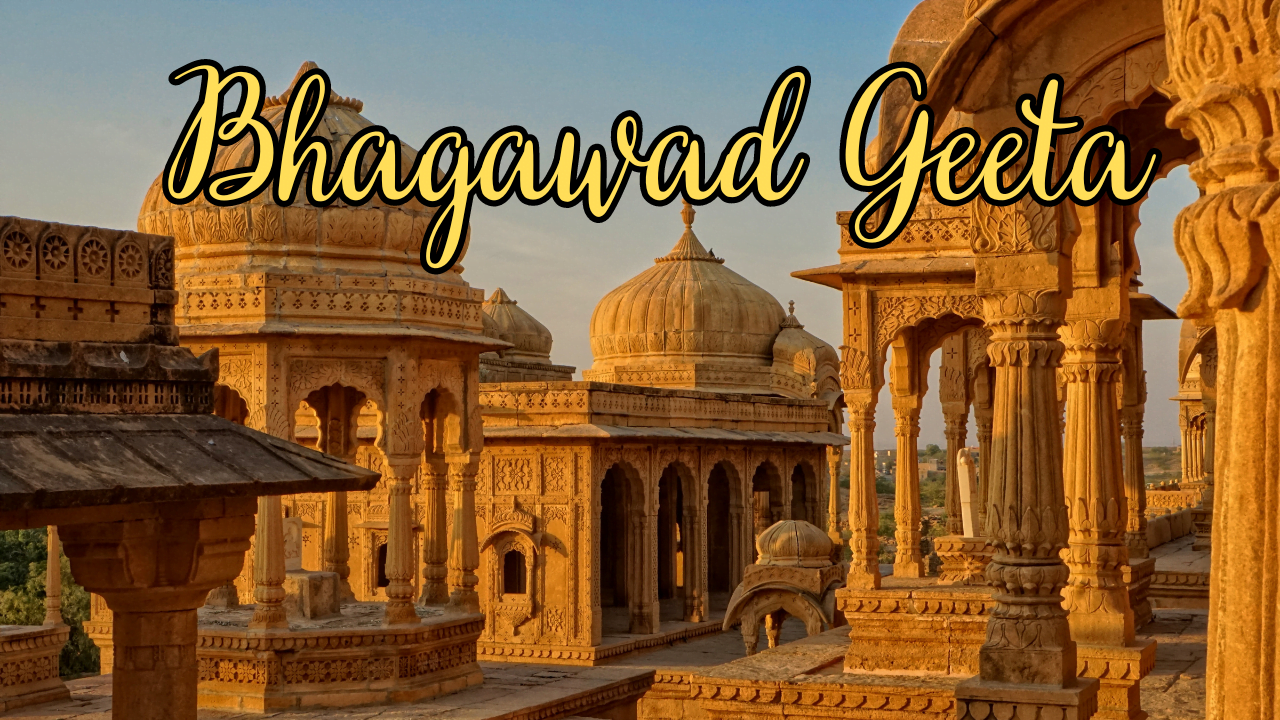Of all the sacred books from the scriptures, Bhagavad Geeta stands out as it is Lord Krishna’s own words. The Bhagavad Geeta is considered as one of the world’s most profound works of art and a manual for everything that speaks of the Truth. It is at times known as the Song of the Lord or the Gospel of the Lord Shri Krishna. The Bhagavad Geeta offers guidance and shows a path to each and every individual who seeks asylum in the lord’s lessons. It was Gita due to which Mahatma Gandhi could do great things. It was Geeta which guided many great leaders who played pivotal roles in their life.
When was Bhagawad Geeta Written
This is the most read book on the planet, the sacred writings which have been much discussed and talked upon. Bhagwad Geeta is part of one of the greatest epics called Mahabharata, which is more than 3000 years old. Mahabharata in size is more than ten times larger than both the famous Greek epics Illiad and Odyssey combined together.
Lessons from Mahabharatha
The Mahabharata recounts the story of the five brothers called Pandavas, the names of these five Pandavas (5 brothers) being Yudhishthira, Bhima, Arjuna, Nakula, and Sahadeva. They were the sons of King Pandu, of Hastinapur and his two wives Kunti and Madri. After the untimely death of King Pandu, the Pandavas spend their childhood at the court of their uncle, the visually impaired King Dhritarashtra. There was constant rivalry right from their childhood between the Pandavas and the Kauravas, the 100 sons of King Dhritarashtra. When they grew up, the old king Dhritarashtra gave his nephews a small part of the huge kingdom, which his oldest son, Duryodhana still resents. He, therefore, routs Yudhisthira, the oldest Pandava, by cheating him in the game of dice. Yudhisthira loses everything in the game of dice and he and his siblings are forced to give up everything in their possession and they are banished out of the kingdom for 12 long years.
What Happens After Pandavas Returns from Exile
After 12 years of exile and the last 13th year of hiding, the Pandavas return to the kingdom to proclaim what is rightfully theirs. The old king Dhritarashtra however cannot convince his son Duryodhana to return their kingdom or any part thereof. This in spite of and, notwithstanding endeavours of compromise by the kings’ counsellors, elders, and wise men like Bheeshma, the most revered and even by Lord Krishna himself. Duryodhana is adamant and doesn’t budge, therefore, the war cannot be averted and is imminent.
Why does Arjuna Not Want to Fight
Both the adversaries, the armies of Pandavas and Kauravas, face each other on the battlefield of Kurukshetra and one of the bloodiest battles of mankind ever was fought. It is here that the Bhagavad Geeta starts. In the midst of one of the bloodiest battles in the history of mankind, fought on the battlefield of Kurukshetra between Kauravas and Pandavas, suddenly Arjuna hung his weapons The great archer Arjuna asks his charioteer, Lord Krishna to take his chariot near the vast armies, so that he could see the warriors and to make an assessment of the enemy’s strength. Arjuna is aghast and in a great dilemma as he sees his own friends, brothers, cousins, and other blood relations on both sides. He also notices his most revered teacher Guru Drona, whom he idolized and respected as his teacher and master. He also sees Bhishma, the grandfather of the dynasty, whom he deeply loved and respected and who had always showered his blessings and affection on him and his brothers. Overcome by emotion and the sight, Arjuna breaks down not knowing what next to do.
How does Krishna convince Arjuna to Fight
It is during this critical hour that Krishna counsels Arjuna in what is known as the Bhagwad Geeta teachings. He tells Arjuna that it is the duty of the warrior (Kshatriya) to uphold the truth (dharma) through selfless action. The entire Geeta consists of the dialogue between Lord Krishna and Arjuna, the fighter on what constitutes the right action, what is the proper understanding of virtues, the meaning of life, and what is the nature of the Divine. Lord Krishna gave emphasis on two main things Karma (Action) and Dharma (Righteousness). This being a war of right over wrong, it is his duty to fight for righteousness to uphold the truth. The Kauravas have broken all rules and laws and thus Arjuna has to do his Karma to uphold Dharma.
Dharma Yudh Mahabharat
The Bhagwad Geeta which is Lord Krishna’s teachings finally culminates in Arjuna’s understanding and realizing his duty and why he has to fight the battle. The Mahabharata then continues with Arjuna picking up his weapons, his bow, and arrows. After a bloody war that lasted for 18 days and in which thousands and thousands of soldiers and greatest warriors died, the Pandavas finally won. Duryodhana and all his brothers are all killed. Thereafter, Yudhishthira becomes the king, and he with his brothers rule the land for 36 years long years before abdicating. All the brothers leave for the Himalayas to pursue peace in their final days where they die one by one.
The Relevance of Bhagawad Geeta in Present-Day Life
The Bhagavad Geeta is the ultimate doctrine of universal truths. It has been since times immemorial, a great source of inspiration, guidance, and knowledge for sadhus, kings, leaders, saints, leaders, philosophers, and common people all across the world. Here we bring you some of the beautiful, inspiring quotes from Bhagwad Geeta which will echo some of its best teachings.
Recent Posts
- India Transformed: A Deep Dive into Narendra Modi’s Impactful Premiership
- The Essence of Sanatan Dharma: A Spiritual Odyssey
- The Maverick of Tinseltown: Clint Eastwood’s Everlasting Influence in Hollywood
- The Man Behind the Mask: A Psychological Portrait of Vladimir Putin
- Bible Verses: The Ultimate Life Hacks

